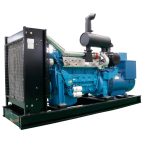Diesel Generators for Remote Locations Ensuring Reliable Power Supply in Off-Grid Areas

Introduction
In remote locations where access to the power grid is limited or non-existent, diesel generators play a crucial role in providing a reliable source of electricity. These generators are designed to operate in off-grid areas where traditional power sources are not feasible. In this article, we will explore the importance of diesel generators in remote locations, their key features, benefits, and considerations for selecting the right generator for specific needs.
Importance of Diesel Generators in Remote Locations
Remote locations, such as rural communities, mining sites, construction sites, and disaster-affected areas, often lack access to a stable power supply. In these situations, diesel generators offer a practical solution to meet the energy needs of the residents or workers in the area. These generators can be easily transported to remote locations and provide a reliable source of electricity for various applications, including powering homes, businesses, machinery, and equipment.
Key Features of Diesel Generators
Diesel generators are known for their durability, reliability, and efficiency, making them well-suited for use in remote locations. Some key features of diesel generators include:
1. Engine: Diesel generators are equipped with a diesel engine that is designed to convert diesel fuel into mechanical energy. These engines are known for their robust construction, high torque output, and fuel efficiency, making them ideal for continuous operation in remote areas.
2. Alternator: The alternator is responsible for converting the mechanical energy generated by the engine into electrical energy. Diesel generators are equipped with high-quality alternators that produce a stable and consistent output voltage, ensuring a reliable power supply to connected loads.
3. Fuel Tank: Diesel generators have an integrated fuel tank that stores the diesel fuel required for operation. The size of the fuel tank varies depending on the generator's capacity and intended runtime. In remote locations, having a sufficient fuel supply is crucial to ensure uninterrupted power supply.
4. Control Panel: The control panel of a diesel generator houses the various controls, indicators, and safety features that allow users to monitor and manage the generator's operation. It provides information on parameters such as voltage, frequency, fuel level, and runtime, enabling users to maintain optimal performance and troubleshoot issues if necessary.
Benefits of Diesel Generators in Remote Locations

The use of diesel generators in remote locations offers several benefits that make them a preferred choice for power generation. Some of the key benefits include:
1. Reliability: Diesel generators are known for their reliability and can operate continuously for extended periods without experiencing performance issues. This reliability is essential in remote locations where access to maintenance and repair services may be limited.
2. https://www.lkpowerplant.com : Diesel generators are more fuel-efficient compared to gasoline generators, allowing them to generate more power for the same amount of fuel. This fuel efficiency is particularly advantageous in remote locations where fuel availability may be limited or costly.
3. Durability: Diesel generators are built to withstand harsh environmental conditions, making them suitable for use in remote locations with extreme temperatures, humidity, or dust levels. Their robust construction ensures long-term durability and minimal maintenance requirements.
4. Scalability: Diesel generators are available in a wide range of sizes and capacities, allowing users to select a generator that meets their specific power requirements. This scalability makes diesel generators suitable for powering small residences, large commercial facilities, or industrial operations in remote locations.
Considerations for Selecting a Diesel Generator
When choosing a diesel generator for a remote location, several factors should be considered to ensure that the generator meets the specific needs of the application. Some key considerations include:
1. Power Requirements: Determine the power requirements of the connected loads to select a generator with the appropriate capacity. Consider both the starting and running power requirements of the equipment to avoid overloading the generator.
2. Fuel Availability: Assess the availability of diesel fuel in the remote location to ensure a reliable fuel supply for the generator. Consider factors such as fuel storage capacity, transportation logistics, and backup fuel options in case of supply disruptions.
3. Runtime Requirements: Determine the desired runtime of the generator to select a model with an adequate fuel tank capacity. Consider factors such as fuel consumption rate, expected load profile, and refueling intervals to ensure uninterrupted power supply.
4. Environmental Conditions: Consider the environmental conditions of the remote location, such as temperature, humidity, altitude, and dust levels, when selecting a diesel generator. Choose a generator with features that can withstand these conditions and ensure optimal performance.
5. Maintenance and Service: Evaluate the availability of maintenance and service support in the remote location to ensure timely repairs and preventive maintenance for the generator. Select a generator from a reputable manufacturer with a network of service providers for ongoing support.
Conclusion
Diesel generators play a vital role in providing a reliable source of electricity in remote locations where access to the power grid is limited or non-existent. These generators offer durability, reliability, and efficiency, making them well-suited for powering homes, businesses, and industrial operations in off-grid areas. By considering factors such as power requirements, fuel availability, runtime needs, environmental conditions, and maintenance support, users can select the right diesel generator to meet their specific needs in remote locations. In conclusion, diesel generators are indispensable tools for ensuring a stable and continuous power supply in remote locations, contributing to the development and sustainability of off-grid communities and industries.
